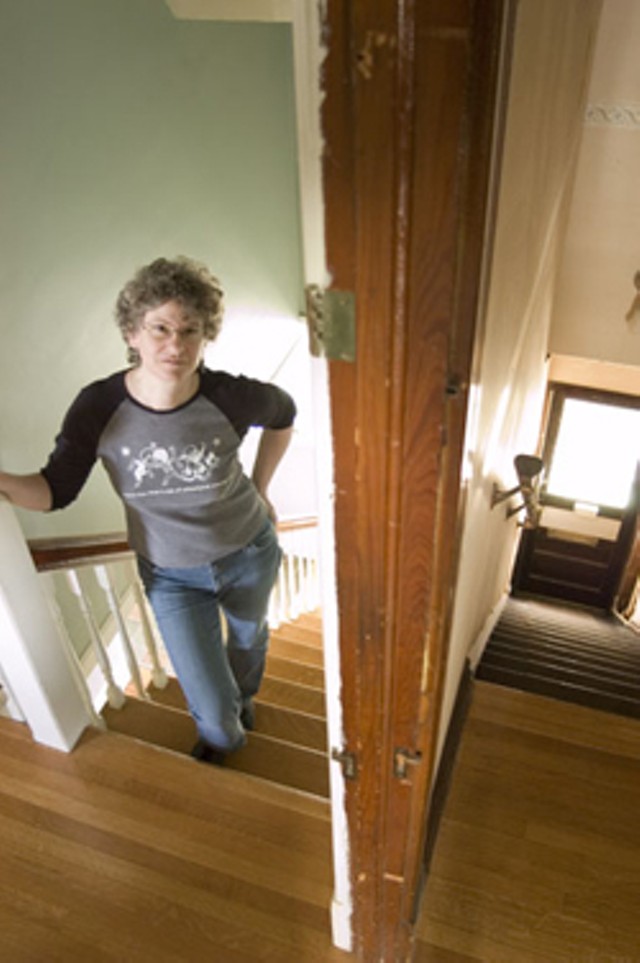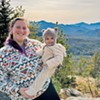Published May 2, 2007 at 6:55 p.m.
I always assumed that I would die in Burlington. Sometimes during idle moments I’d find myself daydreaming about my own funeral, running through a roster of possible guests: friends and neighbors, synagogue members, political allies and adversaries, colleagues from my work and my husband’s. I wasn’t so much being morbid — well, OK, maybe there was that, too — as I was expressing satisfaction at being so deeply rooted in this community; acknowledging how assuredly this place has become my home.
And that’s a great thing, because as homes go, it doesn’t get much better than here. Where else can you walk beside water as lovely as Lake Champlain? Pick snow peas and strawberries within a five-minute drive of first-class restaurants and a concert hall that brings in the likes of Sonny Rollins and Anoushka Shankar? In what other U.S. city do the major political battles pitch progressive Democrats against progressive Progressives? Twenty years ago, we woke after our first snowfall here anticipating hours of shoveling, only to realize that city plows had already cleared the sidewalk. I thought, “We have moved to heaven.”
Today, I’m not just enchanted but entrenched. So much so that as recently as last fall, I couldn’t imagine ever leaving of my own volition. But as it turns out, I’m doing just that. This summer, I’ll relocate with my family to Providence, Rhode Island, where my husband will be teaching at Brown University. When a friend heard the news the other day, he asked, “What are you, nuts?”
I’ve been wondering the same thing myself.
****************
We came to Burlington in 1987 from Los Angeles. David was a freshly minted PhD in philosophy, poised to begin teaching at UVM. I was an aspiring writer with a 2-year-old daughter and a second child in gestation. We settled into a raised ranch in the suburban New North End and quickly made friends with the other young families on the block.
In small-town, open-government Vermont, personal connections can easily slide into civic involvement. At least, that’s how it worked for me. Concerns about apartments proposed for the woods behind our house led me to my Neighborhood Planning Assembly. An obsession with reading to my kids turned into a seat on the Library Commission. In 1993, I ran for City Council.
I lost the election — and discovered a downside of chummy communities. In the course of the campaign, I met scores of my fellow New North Enders, and carefully compiled a roster of assumed allies and adversaries. Many Town Meeting Days later, I still couldn’t bring myself to buy gas from the station owner who’d refused my campaign sign and posted my rival’s. Hearing the name of one of my kids’ classmates, I would note the child’s parents’ political persuasion. Not all these associations were negative. My brief political career actually netted me many more personal friends than foes. But the us-versus-them mindset soon felt like a burden. I longed to live more anonymously.
I also wanted a house that looked more like the one I’d grown up in. This desire deepened after my parents died: my father at age 69 and my mother four years later, at 71. After her death, my siblings and I sold the 100-year-old Victorian in New Jersey that had been our family home since I was a baby. Although I hadn’t lived there since high school, I still set my compass by the place. The string of addresses I’d occupied since had all felt provisional and insubstantial. Without that house to go home to, I wasn’t just orphaned, but anchor-less.
It was hardly a coincidence that, not long after my mother’s death, David and I began to consider trading our “Leave It to Beaver” raised ranch for an older home closer to downtown. It wasn’t just the architecture we were after. With our kids now in their teens, being close to Church Street held more appeal than living on a cul-de-sac of connected backyards filled with ready playmates. David would be able to walk to work, and I could stroll to my synagogue, where I had found a comforting spiritual home since losing my parents.
Once we’d settled on our target location, we crafted a letter in which we described our worthy family and expressed our desire to live on the recipient’s wonderful street. Then we sent our missive to the owners of 13 specific houses. Nine months later we got a call from a couple. They had saved our letter all this time. Were we still interested? We were.
It’s a great old house with quirky charm: a staircase to nowhere; walls with rounded corners; trippy, old-lady wallpaper in the living room. In the seven years since we moved in, we’ve gradually made it our own. We tarted up the outside with five custom colors, planted bulbs in the backyard and, for David’s 50th birthday, restored the wainscoted dining room. We also filled my grandmother’s antique plant stand with Mardi Gras beads, and displayed my collection of disembodied doll parts.
Among the pluses of the place was a south-facing bedroom I claimed as my office. While the rest of the family was at school and work, I sat at my sunny desk writing stories for Seven Days. A year later, I gave up my freelance status for an editing position. The work connected me with still more people, from cavers to classical composers to the entomologist who turned me on to hissing Madagascar cockroaches. The paper also gave me a forum for writing about myself, and I got used to meeting people who already knew intimate details about my life: how I lost weight, or managed my intermarriage, or taught my daughter to drive.
I thrived on the attention, and the collegiality of the office. Maybe anonymity wasn’t what I wanted, after all.
****************
David wasn’t looking to leave UVM. But when he got a call asking if he’d be interested in teaching at Brown, the pitch was too good to ignore. There was the allure of the school, which promised a cushy job with great colleagues and students plus it had the added appeal of having rejected David when he’d applied as an undergraduate. There was the reputation of Rhode Island: miles of coastline, high restaurant-to-resident ratio, bluest state in the Union. And there was also us. Now that our offspring were basically launched, we could begin to imagine launching ourselves.
For years, we’d watched friends take sabbaticals in exotic locations while David used his to concentrate on his research — at home. The thought of temporarily uprooting all four of us didn’t seem worth the bother. Especially when we were so content here. But we’d started to fantasize about spending his upcoming year off — when both kids would be in college — someplace new. We’d get a break from our routine, then return to where we belonged.
Brown presented the possibility of simply . . . going.
The thought left me dizzy with exhilaration. And terror. An elaborate crisscross of connections tied me securely to Burlington. Did I dare cut myself loose? All the details of my daily life suddenly took on an air of hyper-reality, each one achingly precious and irreplaceable. The sweetness of a sun-warmed tomato eaten from the vine in the Intervale. The rumble of snow sliding off our slate roof. The rush of standing at the front of the synagogue on High Holidays and leading 200 people in prayer. The satisfaction and fun of working at Seven Days. The happy discovery that the helpful employee in the hardware store went to kindergarten with my son. The fact that I can’t walk between my house and downtown without encountering at least one personal acquaintance — and usually more.
This business of always running into people reminded me of how it used to be when I shopped with my mother. After 40 years, she couldn’t navigate the frozen-foods section of her local A&P without stopping to chat half a dozen times. “This is why I can never leave,” she’d comment to me; by then she’d retired and been widowed, and still rejected the idea of relocating.
Coming across my third familiar face between the produce area and the bulk spices in City Market, I’d remember my mother’s mantra. It had always sounded like the voice of my conscience — an admonition that once you’ve found your perfect place, the only prudent response is to stay put.
But now that I was considering doing the opposite, her words suggested something different. They reminded me that the home I have made for myself in Vermont as an adult has decisively replaced the one in New Jersey I was provided as a child. And, just as I have been able to establish myself in a hometown that’s not my mother’s, perhaps it’s also possible for me to interpret “home” differently from the way she did. I’d always heard her line as prescriptive, a lesson in how I should live. But maybe it was simply descriptive — an observation about how she did.
The realization hit me one day when I was walking downtown and scanning passersby for acquaintances. Between my house and Church Street, I counted seven. And I didn’t just identify them by name. I also ran through my mental file on each one, reviewing everything I knew about them and the complex webs of association linking them to other people, whose info was also stored in my head. As I exchanged greetings with the sales clerk at Macy’s, I silently noted that she’s the mother of the boss of the son-in-law of my co-worker’s neurologist.
What would it be like, I wondered, to have the completely opposite experience — to walk around town without knowing a soul? The answer came to me immediately: It would feel great. And that thought quickly led to others: What would it be like to start from scratch in a place where no one knew the first thing about me? Where I could redefine myself, free from anyone’s expectations? To begin a brand-new chapter? The answer was easy: It would be pretty damned fine.
Just because Burlington is a perfect place for us to live, that doesn’t mean it’s the only perfect place. And where is it written that in the course of a lifetime, each person gets to experience just one version of heaven?
“It’s like when you go on vacation,” David suggested when I told him what I’d been thinking. “If you visit more than one place, you feel like you’ve been away a longer time.”
It came down to a choice between kicking back and staying comfortable and kicking it up a notch and trying something new. We chose the latter.
Once we’d decided, things fell into place. After Seven Days columnist Peter Freyne published my plans in the paper, I received an email from someone who was interested in purchasing our home. Finding a place in Providence proved harder, but only slightly. As this essay hits the streets — on the first day of my “retirement” from Seven Days — we’ll be in Rhode Island inspecting the house we’ve contracted to buy. It’s a 15-minute walk from a village center where, according to our real estate agent, “Everyone knows each other” — an old Victorian with a view of Narragansett Bay from the third-floor room where I plan to spend my days writing. When I emailed a picture to my niece, she wrote back, “Looks like home.”
It’s wrenchingly sad to say goodbye to a place that’s been so good to us. But experiencing that goodness is what has given us the courage to try someplace new.
More By This Author
About the Artist

Matthew Thorsen
Bio:
Matthew Thorsen was a photographer for Seven Days 1995-2018. Read all about his life and work here.
Matthew Thorsen was a photographer for Seven Days 1995-2018. Read all about his life and work here.
Speaking of...
-

Overdose-Prevention Site Bill Advances in the Vermont Senate
May 1, 2024 -

Aggressive Behavior, Increased Drug Use at Burlington's Downtown Library Prompt Calls for Help
May 1, 2024 -

Reinvented Deep City Brings Penny Cluse Café's Beloved Brunch Back to Burlington
Apr 30, 2024 -

Burlington’s Blue Cat Steak & Wine Bar Closes After 18 Years
Apr 30, 2024 -

Burlington Budget Deficit Balloons to $13.1 Million
Apr 25, 2024 - More »
Comments
Comments are closed.
From 2014-2020, Seven Days allowed readers to comment on all stories posted on our website. While we've appreciated the suggestions and insights, right now Seven Days is prioritizing our core mission — producing high-quality, responsible local journalism — over moderating online debates between readers.
To criticize, correct or praise our reporting, please send us a letter to the editor or send us a tip. We’ll check it out and report the results.
Online comments may return when we have better tech tools for managing them. Thanks for reading.







































